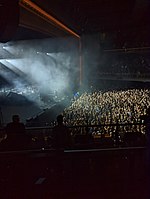Fenway Park

Fenway Park is a baseball stadium located in Boston, Massachusetts near Kenmore Square. Since 1912, it has been the home of the Boston Red Sox, the city's American League baseball team, and since 1953, its only Major League Baseball (MLB) franchise. While the stadium was built in 1912, it was substantially rebuilt in 1934, and underwent major renovations and modifications in the 21st century. It is the oldest active ballpark in MLB. Because of its age and constrained location in Boston's dense Fenway–Kenmore neighborhood, the park has many quirky features, including "The Triangle", Pesky's Pole, and the Green Monster in left field. It is the fifth-smallest among MLB ballparks by seating capacity, second-smallest by total capacity, and one of eight that cannot accommodate at least 40,000 spectators. Fenway has hosted the World Series 11 times, with the Red Sox winning six of them and the Boston Braves winning one. Besides baseball games, it has also been the site of many other sporting and cultural events including professional football games for the Boston Redskins, Boston Yanks, and the New England Patriots; concerts; soccer and hockey games (such as the 2010 NHL Winter Classic); and political and religious campaigns. On March 7, 2012 (Fenway's centennial year), the park was added to the National Register of Historic Places. Former pitcher Bill Lee has called Fenway Park "a shrine". It is a pending Boston Landmark, which will regulate any further changes to the park. The ballpark is considered to be one of the most well-known sports venues in the world and a symbol of Boston.
Excerpt from the Wikipedia article Fenway Park (License: CC BY-SA 3.0, Authors, Images).Fenway Park
Jersey Street, Boston Fenway / Kenmore
Geographical coordinates (GPS) Address Phone number Website External links Nearby Places Show on map
Geographical coordinates (GPS)
| Latitude | Longitude |
|---|---|
| N 42.34625 ° | E -71.09775 ° |
Address
Fenway Park
Jersey Street 4
02115 Boston, Fenway / Kenmore
Massachusetts, United States
Open on Google Maps










